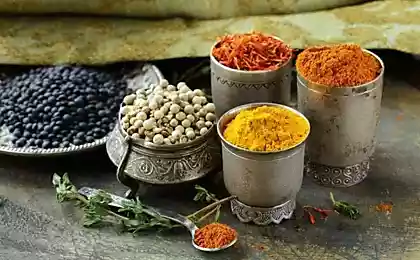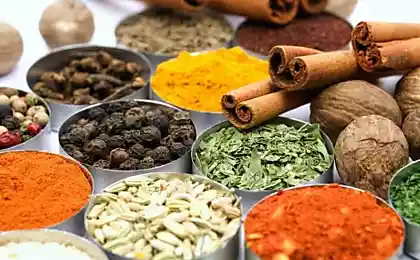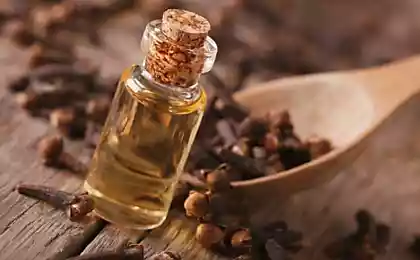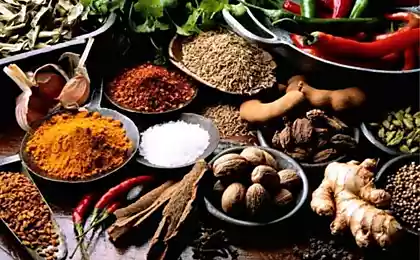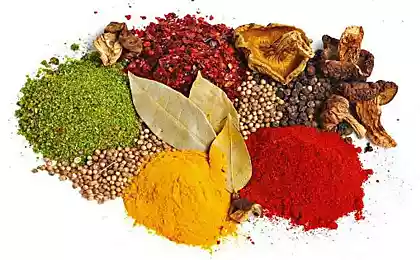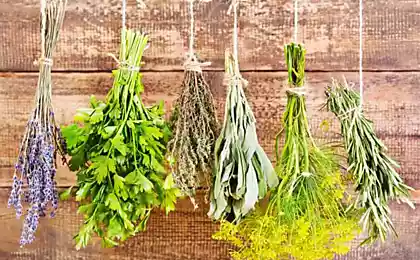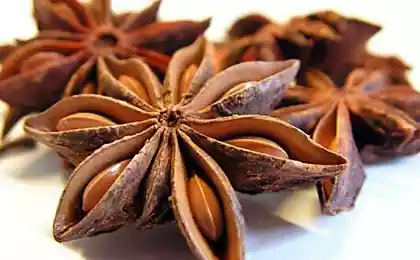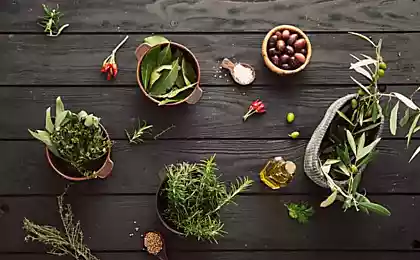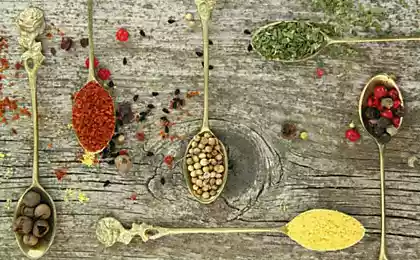418
Anesthetic and antiseptic clove
Carnation is one of the most valued spices. It is widely known throughout the world for their medical and culinary quality. Spice are flower buds of an evergreen tree that originates from the rainy forests of Indonesia. Botanists refer cloves to the family Myrtaceae and the genus Sygyzium. Its scientific name is Sygizium aromaticum. In the early stages of forming its flowers are pale yellow, then gradually turn green and eventually turn bright red, and then it's time to collect.
The clove flower buds are harvested usually when they reach a length of 1.5-2 cm. On resource Nutrition And You said a lot about the qualities that make pink is not only a fragrant spice, but also a very useful addition to the diet.
Each Bud has a floral Cup, sepal ending in four and four unopened petals. These unopened petals forming a small ball at the top of the flower. Sweet aroma of cloves provides therein the essential oil eugenol.
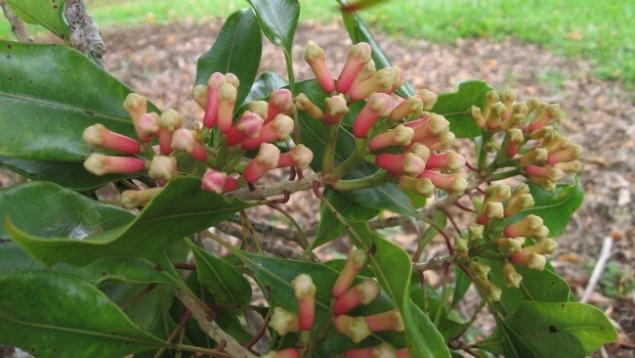
The benefits of cloves for health
Contained active components in cloves are known for their antioxidant, antiseptic, analgesic (local), anti-inflammatory, local irritant (warming and soothing), carminative and counteracts flatulence properties.
This spice contains healthy essential oils, including eugenol. It belongs to the class of chemical compounds phenylpropanoids, giving a nice sweet flavor to the buds of clove.Eugenol has local anesthetic and antiseptic qualities and for this reason is used in dentistry in the treatment process.
In cloves contain essential oils — acetylamino, beta-caryophyllene and vanillin. Contains also tannins (tannins) — tannic acid and methyl salicylate (painkiller). Flavonoids in carnation — eugenin, kaempferol, rhamnetin and augentin. Triterpenoids — oleanolic acid, stigmasterol (stigmasterol) and campesterol. Contained in cloves and a few sesquiterpenes.
The active ingredients in cloves can increase intestinal contractility, and improve digestion by increasing the production of digestive enzyme. Thus, this spice helps to reduce indigestion and constipation.
In appreciable quantities cloves contain minerals such as potassium, manganese, iron, selenium and magnesium. Potassium is an important electrolyte fluids and cells of the body that helps control heart rate and blood pressure. Manganese is used by the body as a factor-associated antioxidant enzyme superoxiddismutase.
In addition, this spices is abundant vitamin a and beta-carotene. These compounds are known for their antioxidant properties. Vitamin a is also necessary for the body to maintain healthy skin and mucous membranes. He needed and for vision. The use of a flavonoid-rich whole foods helps to protect the body from lung cancer and oral cavity.
In addition to the above qualities of clove, this spice is a good source of vitamins K, B6 (pyridoxine), thiamin (vitamin B-1), C and Riboflavin. Eating foods rich in vitamin C helps the body develop resistance to infectious agents and to eliminate damaging free radicals.
The use of cloves in medicine
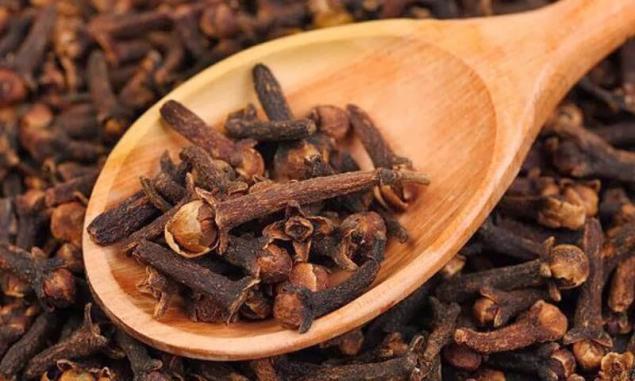
The essential oil eugenol contained in this spices, is used therapeutically in dentistry as a local anesthetic and antiseptic for teeth and gums.
It was also found that eugenol reduces blood sugar levels in diabetics, but a need for more detailed studies in order to establish whether it gives it such an advantage.
A decoction of cloves is sometimes used to treat flatulence and indigestion in traditional medicine.
She is also known for its natural anti-parasitic properties.
Essential volatile oils act as local irritating means, which means they irritate the skin and expand blood vessels, causing a rush of blood that gives the skin a feeling of warmth. Thus, they are a popular home remedy for treatment of arthritis and muscle pain. Use them in preparig and hot tubs.
Caution
Eating foods flavored with lots of clove, can irritate the gastrointestinal tract and Central nervous system disorders. Dishes seasoned with this spice should be avoided in stomach ulcers, ulcerative colitis and diverticulitis if. Eating cloves should be avoided during pregnancy.
Nutritional value of cloves
In parentheses are the percentage of the daily allowance. Nutritional value is based on 100 grams ground cloves according to information from the Ministry of agriculture of the USA published on the pages of the website Nutrition And You.
General information:
energy value 47 kcal (2%);
carbohydrates 10.51 grams (8%);
protein — 3.27 grams (6%);
fats — 0.15 grams (0.5 per cent);
fiber, part of the food — 5.4 g (14%).
Vitamins:
folic acid (vitamin B9) 68 micrograms (17%);
nicotinic acid (vitamin B3) — 1,046 milligrams (6,5%);
Pantothenic acid — 0,338 mg (7%);
pyridoxine (vitamin B6) — 0,116 mg (9%);
Riboflavin (vitamin B2) — 0,066 mg (5%);
thiamine (vitamin B1) — 0,072 milligrams (6%);
vitamin a, which very much is contained in dandelion — 13 international units (IU, IU) — 0,5%;
vitamin C 11,7 mg (20%);
vitamin E — 0.19 mg (1%);
vitamin K, an incredibly rich source of which is sage — 14.8 micrograms (12%).
Electrolytes:
sodium 94 milligrams (6%);
potassium 370 milligrams (8%).
Minerals:
calcium, 44 milligrams (4%);
copper — 0,231 milligrams (27%);
iron — 1.28 mg (16%);
magnesium — 60 milligrams (15%);
manganese — 0,256 milligrams (11%);
phosphorus 90 milligrams (13%);
selenium — 7.2 micrograms (13%);
zinc — 2.32 milligrams (21%).
Phytonutrients:
beta-carotene (ß-carotene), which is rich in carrots — 8 micrograms;
beta-cryptoxanthin (ß-cryptoxanthin) — 0 micrograms;
lutein-zeaxanthin 464 micrograms.
Did you know early on painkillers and anti-inflammatory properties of this popular spice? published
P. S. And remember, only by changing their consumption — together we change the world! ©
Join us in Facebook , Vkontakte, Odnoklassniki
Source: hi-news.ru/science/biologiya-anesteticheskaya-i-antisepticheskaya-gvozdika.html
The clove flower buds are harvested usually when they reach a length of 1.5-2 cm. On resource Nutrition And You said a lot about the qualities that make pink is not only a fragrant spice, but also a very useful addition to the diet.
Each Bud has a floral Cup, sepal ending in four and four unopened petals. These unopened petals forming a small ball at the top of the flower. Sweet aroma of cloves provides therein the essential oil eugenol.

The benefits of cloves for health
Contained active components in cloves are known for their antioxidant, antiseptic, analgesic (local), anti-inflammatory, local irritant (warming and soothing), carminative and counteracts flatulence properties.
This spice contains healthy essential oils, including eugenol. It belongs to the class of chemical compounds phenylpropanoids, giving a nice sweet flavor to the buds of clove.Eugenol has local anesthetic and antiseptic qualities and for this reason is used in dentistry in the treatment process.
In cloves contain essential oils — acetylamino, beta-caryophyllene and vanillin. Contains also tannins (tannins) — tannic acid and methyl salicylate (painkiller). Flavonoids in carnation — eugenin, kaempferol, rhamnetin and augentin. Triterpenoids — oleanolic acid, stigmasterol (stigmasterol) and campesterol. Contained in cloves and a few sesquiterpenes.
The active ingredients in cloves can increase intestinal contractility, and improve digestion by increasing the production of digestive enzyme. Thus, this spice helps to reduce indigestion and constipation.
In appreciable quantities cloves contain minerals such as potassium, manganese, iron, selenium and magnesium. Potassium is an important electrolyte fluids and cells of the body that helps control heart rate and blood pressure. Manganese is used by the body as a factor-associated antioxidant enzyme superoxiddismutase.
In addition, this spices is abundant vitamin a and beta-carotene. These compounds are known for their antioxidant properties. Vitamin a is also necessary for the body to maintain healthy skin and mucous membranes. He needed and for vision. The use of a flavonoid-rich whole foods helps to protect the body from lung cancer and oral cavity.
In addition to the above qualities of clove, this spice is a good source of vitamins K, B6 (pyridoxine), thiamin (vitamin B-1), C and Riboflavin. Eating foods rich in vitamin C helps the body develop resistance to infectious agents and to eliminate damaging free radicals.
The use of cloves in medicine

The essential oil eugenol contained in this spices, is used therapeutically in dentistry as a local anesthetic and antiseptic for teeth and gums.
It was also found that eugenol reduces blood sugar levels in diabetics, but a need for more detailed studies in order to establish whether it gives it such an advantage.
A decoction of cloves is sometimes used to treat flatulence and indigestion in traditional medicine.
She is also known for its natural anti-parasitic properties.
Essential volatile oils act as local irritating means, which means they irritate the skin and expand blood vessels, causing a rush of blood that gives the skin a feeling of warmth. Thus, they are a popular home remedy for treatment of arthritis and muscle pain. Use them in preparig and hot tubs.
Caution
Eating foods flavored with lots of clove, can irritate the gastrointestinal tract and Central nervous system disorders. Dishes seasoned with this spice should be avoided in stomach ulcers, ulcerative colitis and diverticulitis if. Eating cloves should be avoided during pregnancy.
Nutritional value of cloves
In parentheses are the percentage of the daily allowance. Nutritional value is based on 100 grams ground cloves according to information from the Ministry of agriculture of the USA published on the pages of the website Nutrition And You.
General information:
energy value 47 kcal (2%);
carbohydrates 10.51 grams (8%);
protein — 3.27 grams (6%);
fats — 0.15 grams (0.5 per cent);
fiber, part of the food — 5.4 g (14%).
Vitamins:
folic acid (vitamin B9) 68 micrograms (17%);
nicotinic acid (vitamin B3) — 1,046 milligrams (6,5%);
Pantothenic acid — 0,338 mg (7%);
pyridoxine (vitamin B6) — 0,116 mg (9%);
Riboflavin (vitamin B2) — 0,066 mg (5%);
thiamine (vitamin B1) — 0,072 milligrams (6%);
vitamin a, which very much is contained in dandelion — 13 international units (IU, IU) — 0,5%;
vitamin C 11,7 mg (20%);
vitamin E — 0.19 mg (1%);
vitamin K, an incredibly rich source of which is sage — 14.8 micrograms (12%).
Electrolytes:
sodium 94 milligrams (6%);
potassium 370 milligrams (8%).
Minerals:
calcium, 44 milligrams (4%);
copper — 0,231 milligrams (27%);
iron — 1.28 mg (16%);
magnesium — 60 milligrams (15%);
manganese — 0,256 milligrams (11%);
phosphorus 90 milligrams (13%);
selenium — 7.2 micrograms (13%);
zinc — 2.32 milligrams (21%).
Phytonutrients:
beta-carotene (ß-carotene), which is rich in carrots — 8 micrograms;
beta-cryptoxanthin (ß-cryptoxanthin) — 0 micrograms;
lutein-zeaxanthin 464 micrograms.
Did you know early on painkillers and anti-inflammatory properties of this popular spice? published
P. S. And remember, only by changing their consumption — together we change the world! ©
Join us in Facebook , Vkontakte, Odnoklassniki
Source: hi-news.ru/science/biologiya-anesteticheskaya-i-antisepticheskaya-gvozdika.html





